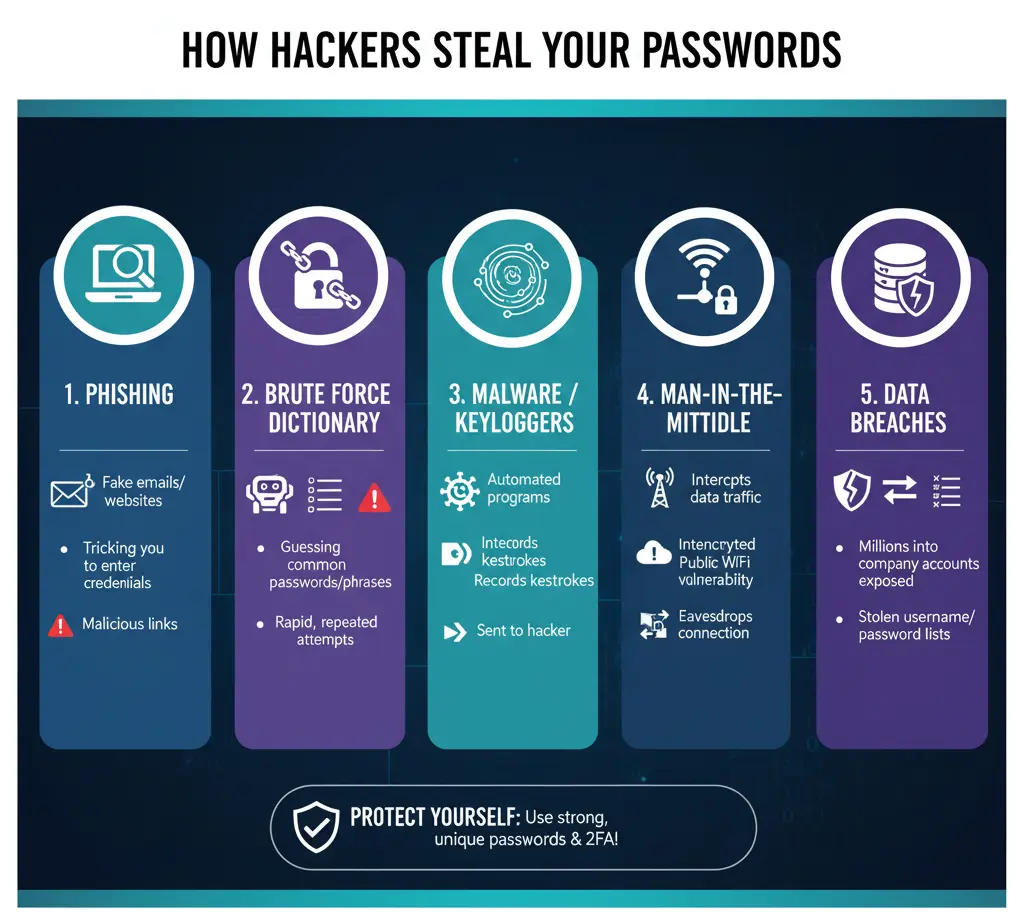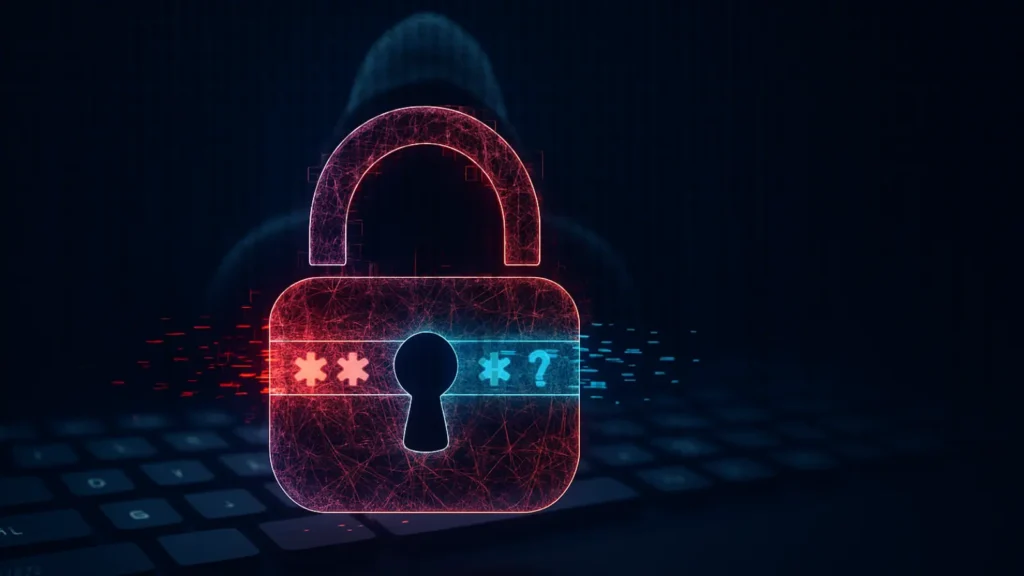Table of Contents
ToggleMost people believe their passwords are secure, but in reality, they get hacked because basic Password Security standards fail. A password that feels complex to you might be easy for hackers to crack using automated tools and data leaks.
No doubt, cybercrime is one of the fastest-growing crimes in the world that impacts online businesses, where hackers use powerful tools that can crack common passwords in seconds.
Securing your passwords doesn’t have to be complicated. You need to be aware of updated cybersecurity tips to protect your online presence from being an easy target. By understanding & learning how to create strong, unique passwords, you can significantly boost your online security.
This article explains why many passwords aren’t as secure as they seem and shares best practices and cybersecurity tips for creating truly strong passwords that can withstand today’s digital threats.
What is Password Security?
Password Security is the practice of protecting your online accounts by creating and managing passwords that are strong, unique, and difficult to guess. It’s your first and most important defense against cyber attacks.
A secure password is long, unique, and hard to predict. To meet modern security standards, experts recommend using at least 12–16 characters, combining random words or phrases, and enabling two-factor authentication (2FA) for an extra layer of defense.
In simple terms, password security means using passwords that are hard for others or computers to guess. It’s the first line of defense against cyber attacks, data breaches, and identity theft.
Why Password Security Matters
Password Security is important because weak passwords are the easiest way for hackers to steal your data. It protects your personal data, online accounts, finances, and online identity from cyber threats.
Every year, millions of people fall victim to data breaches caused by poor password habits. Once a single password is exposed, cyber attackers can use it to access multiple accounts through a technique called credential stuffing.
- In 2023, a major data breach exposed millions of user accounts because employees reused simple passwords.
- The “RockYou” leak, one of the largest in history, revealed over 32 million passwords many as basic as “123456” and “password.”
How Hackers Steal Your Passwords

Hackers use clever tricks and powerful tools to exploit weak password security. Understanding their methods helps you protect your accounts before it’s too late.
The most common techniques used by hackers to steal your weak passwords are phishing attacks, brute force attacks, dictionary attacks, keylogging viruses, and even public Wi-Fi can be risky. Without encryption, hackers can intercept your login data as you sign in to accounts on unsecured networks.
In most cases, weakness occurs because users underestimate the need for password security. Increasing your online security defenses with unique, complex passwords and multi-factor authentication (MFA) can dramatically reduce the risk.
Best Practices for Strong Passwords
People also asked, “What makes a password truly strong?” The answer is that strong passwords protect your online accounts from hackers. The key to better password security is combining length, complexity, and uniqueness, and adding extra layers like multi-factor authentication (MFA).
Here’s how to create passwords that stay secure:
-
Make Passwords Long (At Least 12–16 Characters): Longer passwords are exponentially harder to break. Combine words, numbers, and symbols in a phrase-like pattern that’s easy for you to remember but impossible for others to guess.
-
Use Complexity Wisely: A secure password includes uppercase and lowercase letters, numbers, and special characters. Avoid predictable patterns like “Password123!” Instead, use a passphrase like “Sun$Laptop!River9“. It’s easier to remember but extremely hard to guess.
-
Never Reuse Passwords: Each account should have a unique password. Reusing passwords across platforms makes you vulnerable to credential stuffing attacks if one site gets breached.
-
Use a Password Manager. Tools like Bitwarden, 1Password, or LastPass securely store all your credentials and even generate complex passwords for you automatically. This ensures both convenience and security.
-
Turn on Multi-Factor Authentication (MFA): Multi-Factor Authentication (MFA) strengthens your password security by adding a second verification step. For even greater protection, you can use our online TOTP generator instead of relying solely on SMS codes.
-
Use a Trusted Password Generator: When in doubt, use a password generator tool to create a random, complex password for you. It removes guesswork and ensures every password meets modern security standards.
A strong password is long, complex, and unique. Combine that with MFA and a password manager, and you’ll have a nearly unbreakable defense against most cyber threats.
Common Mistakes and Weak Password Habits
Even the strongest-looking password can fail if you make simple, everyday mistakes. When it comes to Password Security, many people unintentionally weaken their protection without realizing it. Here are some of the most common password habits that put your accounts at risk:
- Reusing passwords across different accounts – If one gets compromised, attackers can access everything else.
- Using common names or words – Simple words like “johnsmith” or “iloveyou” are among the first tested by hackers.
- Relying on keyword patterns – Combinations like “qwerty” or “asdfgh” are easy to predict and frequently targeted.
- Using sequential numbers or letters – “123456” or “abcdef” might feel clever, but can be cracked instantly.
- Creating variations of the word “password” – Tweaks like “P@ssword123” aren’t much stronger; they follow predictable patterns.
- Including personal details – Birthdays, pet names, or favorite sports teams are easy to find online.
Most Commonly Used (and Easily Hacked) Passwords
Wondering what the most common passwords are? These are short, predictable combinations that hackers can break in less than a second. Using such passwords seriously weakens your Password Security and exposes your accounts to quick attacks.
✅ Here are the top 10 most commonly used passwords (and how fast they can be hacked)
| Rank | Weak Password Example | Time to Crack |
|---|---|---|
| 1️⃣ | 123456 | < 1 second |
| 2️⃣ | password | < 1 second |
| 3️⃣ | 123456789 | < 1 second |
| 4️⃣ | qwerty | < 1 second |
| 5️⃣ | 111111 | < 1 second |
| 6️⃣ | abc123 | < 1 second |
| 7️⃣ | password1 | < 1 second |
| 8️⃣ | iloveyou | < 1 second |
| 9️⃣ | admin | < 1 second |
| 🔟 | letmein | < 1 second |
Conclusion
Many people believe their passwords are strong, but most aren’t. In an age where cyberattacks, data breaches, and identity theft are common, improving your Password Security is no longer an option; it’s essential.
Don’t wait until a data breach exposes your information.
Start improving your Password Security today. Update your old passwords, enable MFA, and consider using a password generator to create stronger, uncrackable combinations.


